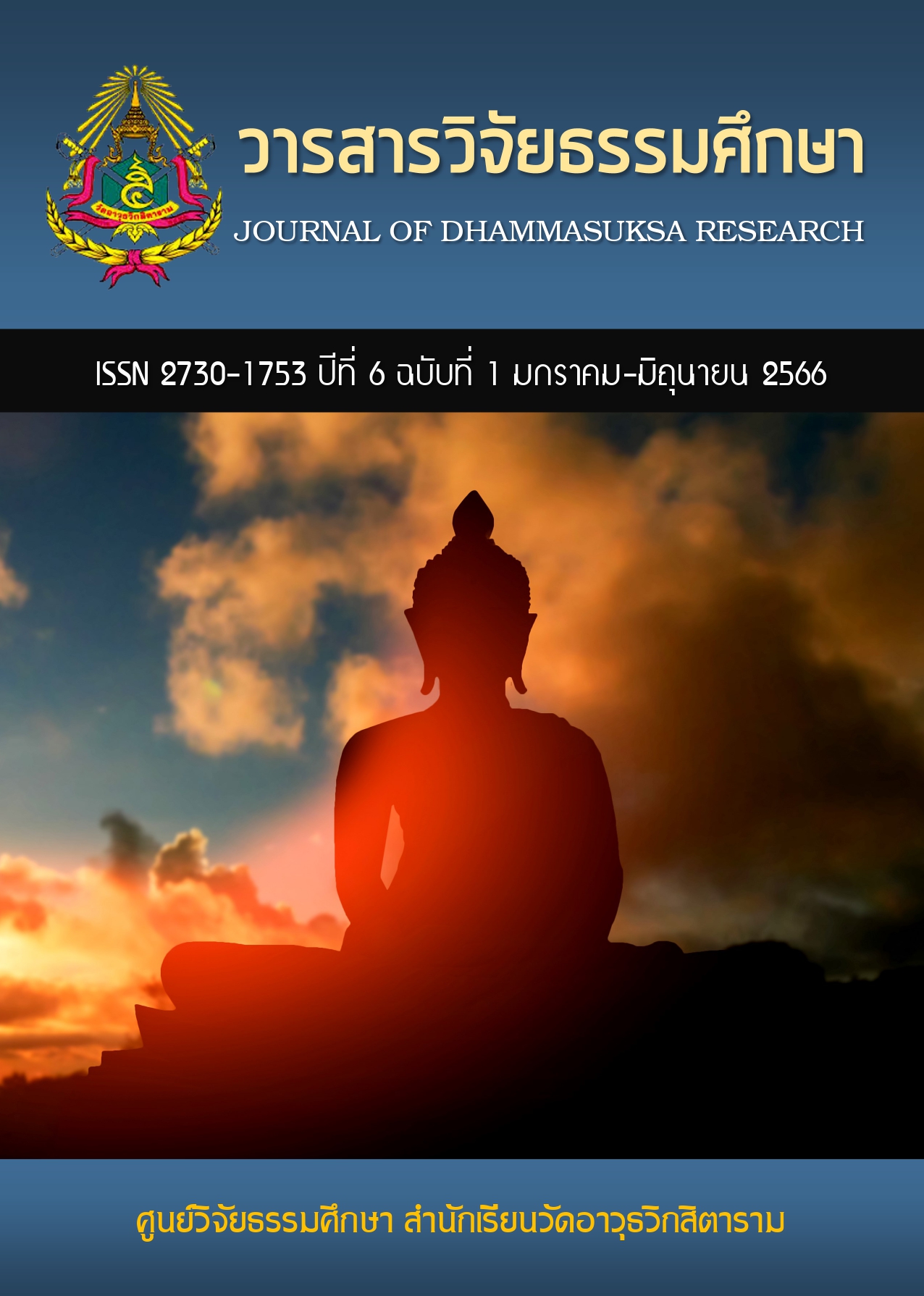The model of Application of Buddhist Philosophy on the Threefold Training for Human Resource Competency Development in the Digital Society
Keywords:
Buddhist Philosophy, the threefold Training, Human Resource Competency Development, Digital SocietyAbstract
The objectives of this research paper were to: (1) study the concept of human resource competency development in the digital society; (2) study the multiplicity of Buddhist philosophy on The Threefold Training; (3) apply the Buddhist philosophy on The Threefold Training to develop human resource competency in the digital society; and (4) create a new body of knowledge about the application of Buddhist philosophy on the Threefold Training to develop human resource competence in the digital society. This was qualitative research that focused on documentary studies under the process of analytic, appreciative and applicative approaches to leading the creation of new philosophical and religious knowledge.
The results showed that the application model of Buddhist philosophy on the Threefold Training for competency development of human resource in the digital society was a model of human resource capacity development in life and work efficiency with 3 important performances. They were; (1) good behavior was good physical, speech, correct and appropriate behavior according to the training in higher morality, rules and etiquette in digital society, (2) good mentality was to have ability to control emotions and manage the mind in various situations effectively according to the training in higher mentality, and (3) good knowledge was understanding life in both daily life and the higher state development of human according to training in higher wisdom through the principles in the Kalamasutta and Yonisomanakikara. Model of develop human resource competency in digital society focused on important competencies were good-behavior, good-mentality, and good-knowledge. The findings are considered new body of knowledge as G-MBK MODEL.
References
เกริกเกียรติ์ ศรีเสริมโภค. (2546). การพัฒนาความสามารถเชิงสมรรถนะ. กรุงเทพฯ: โรงพิมพ์นาโกต้า.
จำเนียร จวงตระกูล. (2553). การพัฒนาทรัพยากรมนุษย์ : ทฤษฏีและการปฏิบัติ. กรุงเทพฯ: บริษัทศูนย์กฏหมายธุรกิจอินเตอร์เนชั่นแนล จำกัด.
พระธรรมปิฏก (ป.อ. ปยุตฺโต). (2539). จะพัฒนาคนกันอย่างไร. พิมพ์ครั้งที่ 8. กรุงเทพฯ: มูลนิธิพุทธธรรม.
.(2543). การพัฒนาคุณภาพชีวิตด้วยจิตวิทยาที่ยั่งยืน. พิมพ์ครั้งที่ 2. กรุงเทพมหานคร: บริษัท สหธรรมิก จำกัด.
พระใบฎีกาธีรศักดิ์ สุธีโร/น้อยอ่อน. (2560). ศึกษาการประยุกต์ใช้หลักไตรสิกขาในการส่งเสริมคุณธรรมจริยธรรม ตามแนวทางพระพุทธศาสนาเถรวาท โรงเรียนกระสังพิทยาคม ตำบลกระสัง อำเภอกระสัง จังหวัดบุรีรัมย์. ปริญญาพุทธศาสตรมหาบัณฑิต, สาขาวิชาพระพุทธศาสนา, บัณฑิตวิทยาลัย, มหาวิทยาลัยมหาจุฬาลงกรณราชวิทยาลัย.
มหาวิทยาลัยสุโขทัยธรรมาธิราช. (2556). เอกสารการสอนชุดวิชาทักษะชีวิต. หน่วยที่ 1-7. พิมพ์ครั้งที่ 12. กรุงเทพฯ: โรงพิมพ์มหาวิทยาลัยสุโขทัยธรรมาธิราช.
วรรณภา ลือกิตินันท์. .(2558). การประยุกต์ใช้แนวคิดสมรรถนะในการจัดการทรัพยากรมนุษย์: กรณีศึกษา บริษัทผลิตยางรถยนต์ชั้นนำระดับโลกแห่งหนึ่ง. วารสารวิทยาการจัดการ 2. ปีที่ 32 ฉบับที่ 1 มกราคม-มิถุนายน 2558: 19-36. แหล่งข้อมูล: https://so03.tci-thaijo.org. สืบค้นเมื่อวันที่ 10 พฤษภาคม 25564.
สำนักงานสภาพัฒนาการเศรษฐกิจและสังคมแห่งชาติ. (ออนไลน์). ยุทธศาสตร์ 20 ปี (2561-2580). แหล่งข้อมูล. www.nesdc.go.th. สืบค้นเมื่อวันที่ 10 พฤษภาคม 2564.
สุมน อมรวิวัฒน์. (2542). การพัฒนาการเรียนรู้ตามแนวพุทธศาสตร์ ทักษะกระบวนการเผชิญสถานการณ์. นนทบุรี: มหาวิทยาลัยสุโขทัยธรรมาธิราช.
อนุชา ภวายน. (2545). การพัฒนาตนเองตามหลักไตรสิกขา: ทรัพยากรมนุษย์กับการพัฒนา. กรุงเทพฯ: กิตติพงศ์การพิมพ์.
Additional Files
Published
How to Cite
Issue
Section
Categories
License
Copyright (c) 2023 Journal of Dhammasuksa Research

This work is licensed under a Creative Commons Attribution-NonCommercial-NoDerivatives 4.0 International License.



